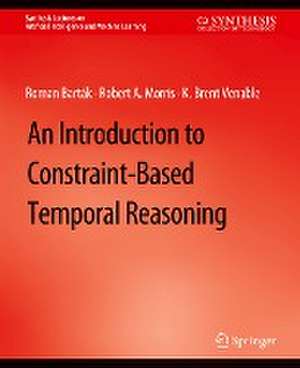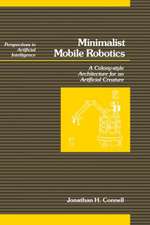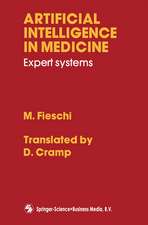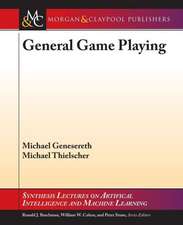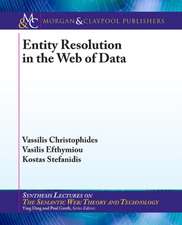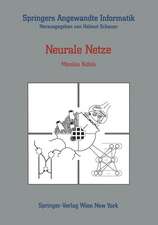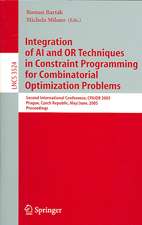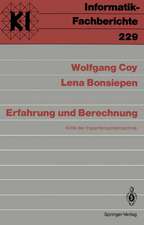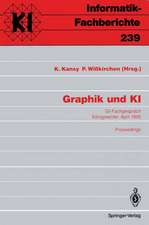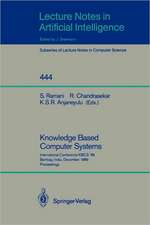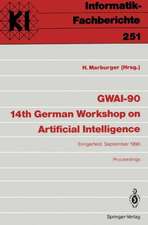An Introduction to Constraint-Based Temporal Reasoning: Synthesis Lectures on Artificial Intelligence and Machine Learning
Autor Roman Barták, Robert A. Morris, K. Brent Venableen Limba Engleză Paperback – 6 mar 2014
| Toate formatele și edițiile | Preț | Express |
|---|---|---|
| Paperback (2) | 224.50 lei 43-57 zile | |
| Springer International Publishing – 6 mar 2014 | 224.50 lei 43-57 zile | |
| Morgan & Claypool – 31 ian 2014 | 325.61 lei 43-57 zile |
Din seria Synthesis Lectures on Artificial Intelligence and Machine Learning
- 20%
 Preț: 415.95 lei
Preț: 415.95 lei - 20%
 Preț: 382.86 lei
Preț: 382.86 lei - 20%
 Preț: 224.50 lei
Preț: 224.50 lei - 20%
 Preț: 222.03 lei
Preț: 222.03 lei - 20%
 Preț: 226.46 lei
Preț: 226.46 lei - 20%
 Preț: 223.51 lei
Preț: 223.51 lei - 20%
 Preț: 194.88 lei
Preț: 194.88 lei - 20%
 Preț: 223.67 lei
Preț: 223.67 lei - 20%
 Preț: 226.14 lei
Preț: 226.14 lei - 20%
 Preț: 333.95 lei
Preț: 333.95 lei - 20%
 Preț: 356.08 lei
Preț: 356.08 lei - 20%
 Preț: 388.17 lei
Preț: 388.17 lei - 20%
 Preț: 384.03 lei
Preț: 384.03 lei - 20%
 Preț: 415.95 lei
Preț: 415.95 lei - 20%
 Preț: 230.94 lei
Preț: 230.94 lei - 20%
 Preț: 227.29 lei
Preț: 227.29 lei - 20%
 Preț: 229.77 lei
Preț: 229.77 lei - 20%
 Preț: 356.08 lei
Preț: 356.08 lei - 20%
 Preț: 345.82 lei
Preț: 345.82 lei - 20%
 Preț: 357.71 lei
Preț: 357.71 lei - 20%
 Preț: 225.48 lei
Preț: 225.48 lei - 20%
 Preț: 224.97 lei
Preț: 224.97 lei - 20%
 Preț: 228.13 lei
Preț: 228.13 lei - 20%
 Preț: 226.97 lei
Preț: 226.97 lei - 20%
 Preț: 337.20 lei
Preț: 337.20 lei - 20%
 Preț: 389.63 lei
Preț: 389.63 lei - 20%
 Preț: 327.12 lei
Preț: 327.12 lei - 20%
 Preț: 328.09 lei
Preț: 328.09 lei - 20%
 Preț: 224.00 lei
Preț: 224.00 lei - 20%
 Preț: 195.06 lei
Preț: 195.06 lei - 20%
 Preț: 227.29 lei
Preț: 227.29 lei - 20%
 Preț: 353.93 lei
Preț: 353.93 lei - 20%
 Preț: 325.86 lei
Preț: 325.86 lei - 20%
 Preț: 385.18 lei
Preț: 385.18 lei - 20%
 Preț: 224.65 lei
Preț: 224.65 lei - 20%
 Preț: 383.48 lei
Preț: 383.48 lei - 20%
 Preț: 177.47 lei
Preț: 177.47 lei - 20%
 Preț: 224.97 lei
Preț: 224.97 lei - 20%
 Preț: 270.51 lei
Preț: 270.51 lei - 20%
 Preț: 358.70 lei
Preț: 358.70 lei - 20%
 Preț: 289.28 lei
Preț: 289.28 lei - 20%
 Preț: 226.64 lei
Preț: 226.64 lei - 20%
 Preț: 177.29 lei
Preț: 177.29 lei - 20%
 Preț: 178.96 lei
Preț: 178.96 lei - 20%
 Preț: 226.46 lei
Preț: 226.46 lei - 20%
 Preț: 177.81 lei
Preț: 177.81 lei - 20%
 Preț: 334.71 lei
Preț: 334.71 lei
Preț: 224.50 lei
Preț vechi: 280.62 lei
-20% Nou
Puncte Express: 337
Preț estimativ în valută:
42.96€ • 44.97$ • 35.75£
42.96€ • 44.97$ • 35.75£
Carte tipărită la comandă
Livrare economică 31 martie-14 aprilie
Preluare comenzi: 021 569.72.76
Specificații
ISBN-13: 9783031004391
ISBN-10: 3031004396
Ilustrații: XIII, 107 p.
Dimensiuni: 191 x 235 mm
Greutate: 0.23 kg
Editura: Springer International Publishing
Colecția Springer
Seria Synthesis Lectures on Artificial Intelligence and Machine Learning
Locul publicării:Cham, Switzerland
ISBN-10: 3031004396
Ilustrații: XIII, 107 p.
Dimensiuni: 191 x 235 mm
Greutate: 0.23 kg
Editura: Springer International Publishing
Colecția Springer
Seria Synthesis Lectures on Artificial Intelligence and Machine Learning
Locul publicării:Cham, Switzerland
Cuprins
Preface.- Summary of Acronyms.- Introduction to Time in AI Systems.- Temporal Frameworks Based on Constraints.- Extensions: Preferences and Uncertainty.- Applications of Temporal Reasoning.- Bibliography.- Authors' Biographies .
Notă biografică
Roman Bartak is a professor at Charles University, Prague (Czech Republic). He leads the Constraint Satisfaction and Optimization Research Group that performs basic and applied research in the areas of satisfiability and discrete optimization problems. His work focuses on techniques of constraint satisfaction and their application to planning and scheduling. The research results are used in products of ILOG, Visopt, and ManOPT/Entellexi. Professor Bártak is teaching courses on artificial intelligence, planning, scheduling, and constraint programming at Charles University and he presented several tutorials on these topics at major conferences such as IJCAI, AAAI, ICAPS, SAC etc.; he is author of the On-line Guide to Constraint Programming (#2 source for Constraint Programming in Google).
Robert A. Morris is a senior researcher in Computer Science in the Exploration Technology Directorate, Intelligent Systems Division at NASA Ames Research Center. His primary professional goal is the application of advanced AI technology in planning, scheduling, and plan execution to the next generation of NASA's exploration systems. His primary research interests include temporal constraint-based reasoning for automated planning and scheduling.
K. Brent Venable is an associate professor in the Department of Computer Science of Tulane University and research scientist at IHMC, the Florida Institute of Human and Machine Cognition. In the past she has been an assistant professor in the Department of Pure and Applied Mathematics at the University of Padova (Italy). Her main research interests are within artificial intelligence and regard, in particular, compact preference representation formalisms, computational social choice, temporal reasoning and, more in general, constraint-based optimization. Her list of publications includes more than 70 papers including journals and proceedings of the main international conferences on the topics relevant to her interests. She is involved in a lively international scientific exchange and, among others, she collaborates with researchers from NASA Ames, SRI International, NICTA-UNSW (Australia), University of Amsterdam (The Netherlands), 4C (Ireland), and Ben-Gurion University (Israel).
